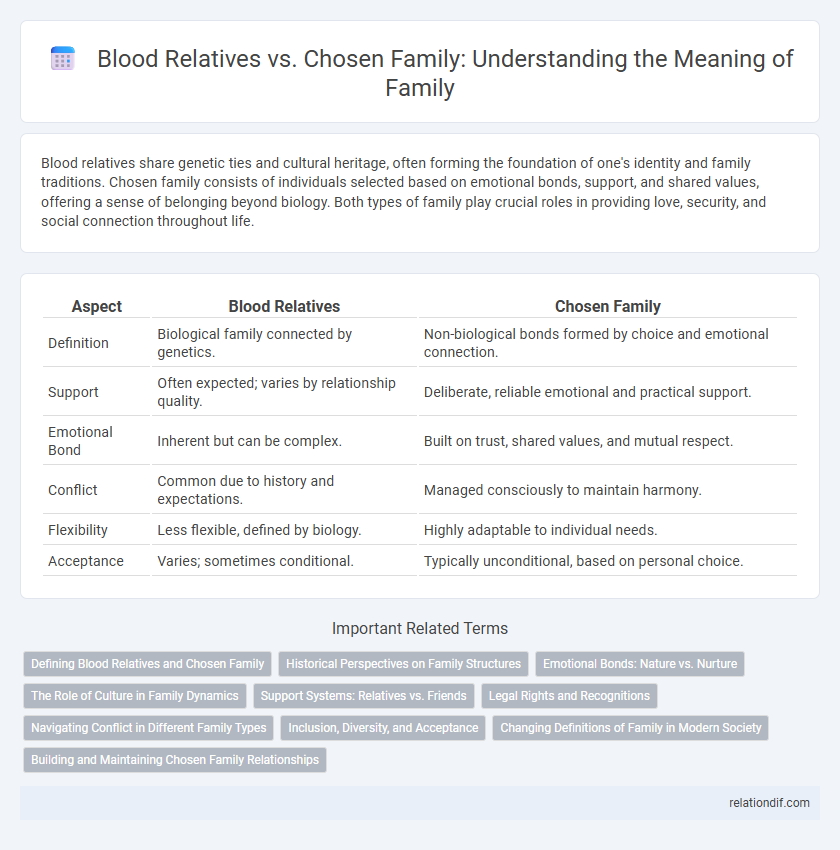Blood relatives share genetic ties and cultural heritage, often forming the foundation of one's identity and family traditions. Chosen family consists of individuals selected based on emotional bonds, support, and shared values, offering a sense of belonging beyond biology. Both types of family play crucial roles in providing love, security, and social connection throughout life.
Table of Comparison
| Aspect | Blood Relatives | Chosen Family |
|---|---|---|
| Definition | Biological family connected by genetics. | Non-biological bonds formed by choice and emotional connection. |
| Support | Often expected; varies by relationship quality. | Deliberate, reliable emotional and practical support. |
| Emotional Bond | Inherent but can be complex. | Built on trust, shared values, and mutual respect. |
| Conflict | Common due to history and expectations. | Managed consciously to maintain harmony. |
| Flexibility | Less flexible, defined by biology. | Highly adaptable to individual needs. |
| Acceptance | Varies; sometimes conditional. | Typically unconditional, based on personal choice. |
Defining Blood Relatives and Chosen Family
Blood relatives are individuals connected by genetics and shared ancestry, such as parents, siblings, and cousins, defining traditional family structures. Chosen family consists of people who form deep, supportive bonds based on emotional connection rather than biology, often including friends, mentors, or partners. Both types of families provide essential social support and a sense of belonging, demonstrating that family identity extends beyond genetic ties.
Historical Perspectives on Family Structures
Historical perspectives on family structures reveal that blood relatives traditionally formed the core social unit, serving as the primary source of identity, inheritance, and social support. However, chosen families have long existed alongside biological ties, particularly in marginalized communities where individuals created kinship networks based on mutual care, solidarity, and shared experiences. Anthropological studies highlight that diverse cultures worldwide have recognized both blood and chosen families as vital for survival and social cohesion.
Emotional Bonds: Nature vs. Nurture
Emotional bonds with blood relatives are often influenced by genetic ties and early shared experiences, creating a foundation rooted in nature. Chosen families, formed through intentional relationships and mutual support, exemplify nurture by cultivating deep emotional connections beyond biological links. Both types of family demonstrate that strong emotional bonds arise from a blend of inherited traits and deliberate, caring interactions.
The Role of Culture in Family Dynamics
Cultural norms significantly shape the dynamics between blood relatives and chosen family, influencing perceptions of loyalty, obligation, and support. In collectivist societies, blood relatives often hold primary importance due to shared heritage and tradition, while individualistic cultures increasingly value chosen family based on emotional bonds and mutual respect. These cultural frameworks dictate how individuals prioritize relationships, impacting caregiving roles, conflict resolution, and social identity within family structures.
Support Systems: Relatives vs. Friends
Blood relatives provide foundational support rooted in shared history and genetics, often offering reliable assistance during crises due to familial obligations. Chosen family, comprised of close friends and loved ones, delivers emotional support tailored to individual needs, fostering a sense of belonging beyond biological ties. Both blood relatives and chosen family networks play crucial roles in creating resilient support systems essential for mental and emotional well-being.
Legal Rights and Recognitions
Legal rights and recognitions often prioritize blood relatives in matters such as inheritance, medical decisions, and custody, which can limit protections for chosen family members. Many jurisdictions are evolving to acknowledge chosen families by extending rights through mechanisms like domestic partnerships, powers of attorney, and tailored legislation. This shift aims to ensure non-biological relationships receive comparable legal protections and social validation as traditional kinship ties.
Navigating Conflict in Different Family Types
Navigating conflict within blood relatives often involves addressing deeply ingrained dynamics, shared history, and unspoken expectations that can complicate communication and resolution. In chosen families, conflicts tend to be managed through conscious agreements and mutual respect, emphasizing emotional support and individual autonomy. Understanding these distinctions enables more effective conflict resolution strategies tailored to the unique nature of each family type.
Inclusion, Diversity, and Acceptance
Blood relatives provide a biological connection, but chosen family offers intentional bonds built on inclusion, diversity, and mutual acceptance. Chosen family emphasizes embracing differences and creating supportive environments beyond genetics, fostering emotional well-being. Prioritizing acceptance within chosen families challenges traditional definitions and celebrates diverse identities and relationships.
Changing Definitions of Family in Modern Society
The concept of family in modern society extends beyond traditional blood relatives to include chosen families formed through intentional bonds of love and support. Studies show that chosen families provide critical emotional and social resources, especially within LGBTQ+ communities and individuals experiencing estrangement from biological kin. This shift reflects evolving cultural values toward inclusivity, acceptance, and the recognition of diverse family structures.
Building and Maintaining Chosen Family Relationships
Building and maintaining chosen family relationships involves intentional communication, mutual support, and shared values that often surpass biological ties. These bonds are strengthened through consistent acts of care, trust-building, and emotional availability, creating a reliable support network. Chosen families prioritize inclusivity and understanding, fostering connection that meets individual emotional needs beyond traditional blood-relative expectations.
blood relatives vs chosen family Infographic

 relationdif.com
relationdif.com